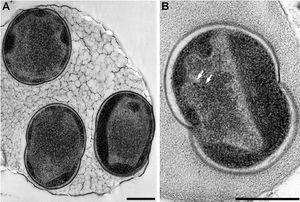Conexibacter: Difference between revisions
Asteinberger (talk | contribs) |
Asteinberger (talk | contribs) |
||
| Line 12: | Line 12: | ||
=Description= | =Description= | ||
Bacteria of the genus ''Conexibacter'' are characterized as small rods with width of 0.6-0.7 um and length of 0.9-1.2 um. They are Gram-positive, aerobic, non-sporulating and are motile by a characteristic long peritrichous flagella. They have a G+C content of 71 mol% and are catalase and oxidase positive. The type strain of this genus is ''Conexibacter woesei'' named in honor of Carl R. Woese, a pioneer with this work on the use of 16S rRNA for phylogenetic analysis. | |||
[[File:alcanivorax bork.jpg|300px|thumb|right|Alcanivorax borkumensis [1F] ]] | [[File:alcanivorax bork.jpg|300px|thumb|right|Alcanivorax borkumensis [1F] ]] | ||
Revision as of 15:07, 7 May 2015
Classification
Domain: Bacteria Phylum: Actinobaceria Class: Actinobaceria Sub-Class: Rubrobacteridae Order: Solirubrobacteriales Family: Conexibacteraceae Genus: Conexibacter Species: C. woesei (type strain), and C. arvalis
Description
Bacteria of the genus Conexibacter are characterized as small rods with width of 0.6-0.7 um and length of 0.9-1.2 um. They are Gram-positive, aerobic, non-sporulating and are motile by a characteristic long peritrichous flagella. They have a G+C content of 71 mol% and are catalase and oxidase positive. The type strain of this genus is Conexibacter woesei named in honor of Carl R. Woese, a pioneer with this work on the use of 16S rRNA for phylogenetic analysis.
Ecology and Significance
Genome Structure
Metabolism
References
[1] Golyshin, Peter N. “Genome Sequence Completed of Alcanivorax borkumensis, a Hydrocarbon-degrading Bacterium That Plays a Global Role in Oil Removal from Marine Systems.” 3 (2003): 215-20. Print.
Figures
[1F]
[1] [2F] [2] [3F] [3] [4F] [4] [5F] [Original Figure. Author: Pawan Dhaliwal] [6F]
http://microbewiki.kenyon.edu/index.php/File:Lorenzo.gif
[7F] [5]
Author
Page authored by Andrew Steinberger, student of Prof. Katherine Mcmahon at University of Wisconsin - Madison.

